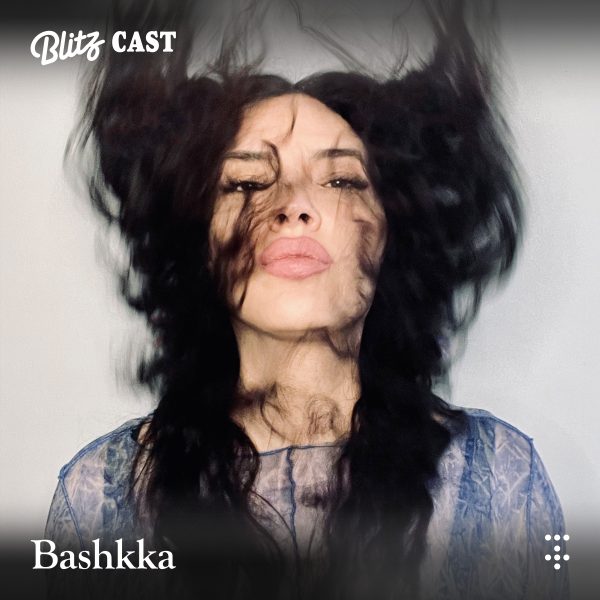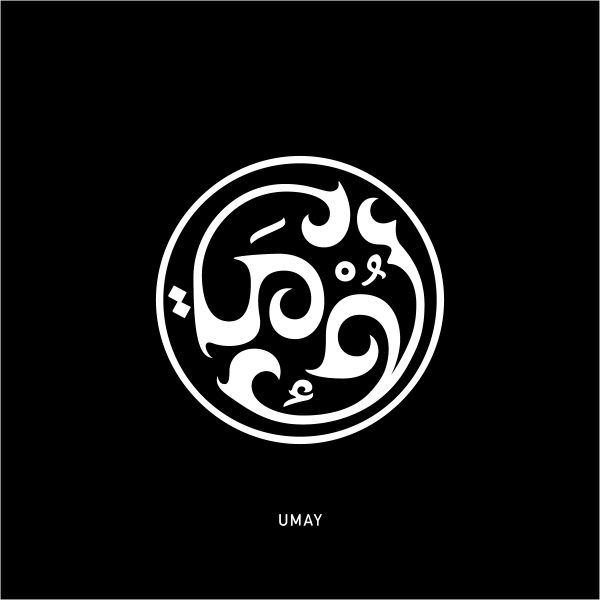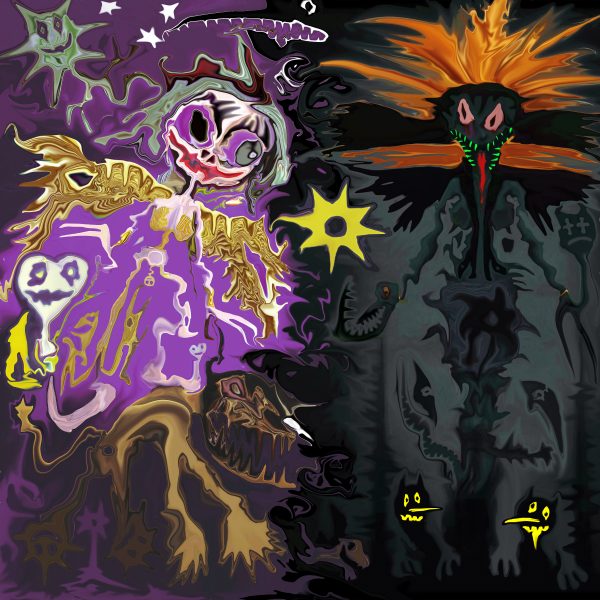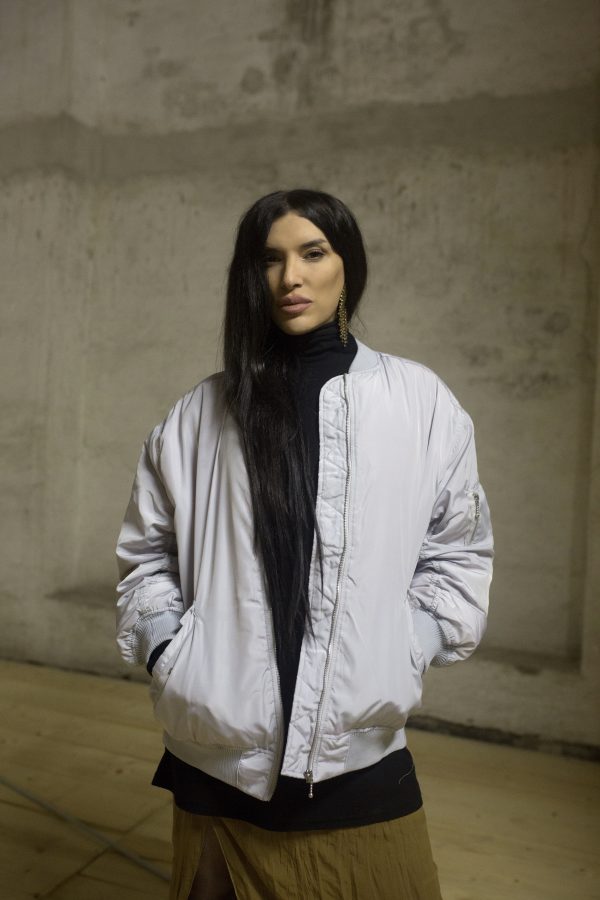



Our resident habibi Bashkka is making waves all over Europe, dishing out muscular funk and queer club bangers and working on making nightlife more diverse and a safer space for LGBTQIA+ people, reminding people of dance music’s origins that’s rooted in queer POC, in Munich and everywhere else she commands the decks – and crowds.
We’re delighted to celebrate the release of her first, debut solo EP called > Maktub < on our good friend Nene H’s label UMAY and to release our new Blitzcast 014 mix by Bashkka too, that showcases a more trippier and tender side of Bashkka.
Listen and buy the EP right here:
We sat down for a talk with Bashkka to find out what shaped the making of her new EP, her residency at Blitz and the politics of dance music. We highly recommend to open up her latest EP or Blitzcast mix before digging into the interview and turn it right up to 11.
- There’s a lot of personal, social and cultural influences that shape your recent EP > Maktub <. You describe it as > a love letter to myself, my heritage and my community. <
Tell us more about these influences and how they shaped the music?
Living a decade of my life in New York truly shaped me. Being introduced to some of the most real and beautiful music, forms of culture and individuals of the NY (Ballroom) scene and sharing similar personal stories, struggles and values, it offered me a different kind of family than the traditional Turkish one I grew up in. I‘d say that this dichotomy has been equally important in shaping my identity as an artist as well as a person. The artwork of the EP was created in collaboration with Copenhagen based Noah Umur Kanber and compliments my influences impressively, taking inspiration from Sumerian mythology and the non-binary goddesses Ishtar and her Sister Ereshkigal which can be seen in the motif. It’s these two figures that, in reflecting on my inner conflicts and regarding my personal history,I found so interesting; Ishtar as the goddess of love, war and sexuality and Ereshkigal, representing the underworld, the rejected and the doomed.
When the opportunity of releasing on UMAY, my dear sister and friend Nene H’s new labels arose, it was a no-brainer for me to release my first piece of music there. The aim of UMAY is to build bridges and empower local culture, granting visibility for geographically underrepresented regions and their artists with a strong focus on South, Western Asian and African artists as well as QTBIPOC. It focuses on establishing trustful and long-lasting relationships with its community, in an attempt to defy the challenges emerging artists come across in the modern music business. While being completely transparent and non-profit, it aims to stand aside in trustful partnerships with its artists, instead of working in hierarchy.
- Tell us, our readers, more about your residency at Blitz: what’s your emotional, personal and musical connection to the club and crowd, how does it shape your music? How has this developed over the course of the last year?
It’s been a very empowering experience for me and I’m thankful about it. To be given such a platform in my hometown where I have total artistic freedom, cultivating chosen family values with everyone involved there and creating memories and moments in an institution where communal spirit is of most importance is incredibly special. Also, Blitz has one of the best, state-of-the-art sound systems and booths in the world which made me not only a better DJ but a better listener, too. I feel very lucky.
- How has the creation process of your upcoming EP shaped the way you approach music, and how have your DJ sets and gigging experiences shaped your EP? We think the tracks on your upcoming EP reflect the sound and style you play as a DJ well: self-confident and muscular, driving and aphrodisiac beats with a decidedly powerful-female, potent-character.
I know that’s right! I take it hahaha. Thank you 🙂 Music to me is a rather unexplainable thing. It’s something bigger than me and all of us that just takes over AND LITERALLY CONTROLS ME.
Knowing how life changing, spiritual and healing dance music and the dancefloor has been to me, I can only hope my music, its delivery and presence can be as powerful to others, too.
- In a recent interview, you stated you’d rather stay in a city like Munich that needs more > work < in terms of LGBTQI+ and trans visibility. How do you view the current state and how is it developing?
We’ve already come a long way in terms of representation and visibility but the work will and should never stop. No matter where! Especially, given the current state of the world, it is more crucial than ever to be even more determined about ourselves and those who committed themselves as our allies. Munich has a flourishing subculture and I believe that this generation and the upcoming generation are truly here for the shits! They do NOT fuck around and I am here for that! Munich’s underground offers queer and marginalized groups more space and representation than one might expect. I am a prime example.
- I can see a pattern of actively working on and with what’s around you. You work with your heritage, such as staying in Munich and working on the scene and queer and trans visibility here. Instead of moving to a city where this is more established, you take inspirational cues from your Turkish heritage, the New York Ballroom scene [where Bashkka lived for ten years] that shaped your personality and music. Your own voice. Would you describe this habit, these tendencies as a political act? If yes: Why is it important to label this act as a political process, to reflect on one’s own heritage(s) and to deal with it in a creative way?
Let me put it to y’all like this: I am a SWANA [Southwest Asian and North African / De-colonial term for Middle Eastern] trans woman and creative vessel of a genre of music that was innovated by queer Black & Brown Folk. I am walking politics baby 🙂 As simple as that.
- Working with personal heritage(s) is often viewed as a politically conservative mindset. What’s your stance on this perception?
A marginalized individual standing up for the marginalized collective, that is my story, truth and my duty. Whatever terminology or interpretation people with different views would want to give my journey and beliefs – it is and will be their opinion even if mine could challenge theirs. And that’s perfectly ok. Generally I’m not interested in pleasing everyone nor do I seek any approval.
- We both agree that club culture is an essential factor for social change and progress (thus, crafting safer spaces LGTBQI+ and especially trans culture and personalities and therefore, step by step making society safer for them): how can we reinforce these developments?
Just increasing attention or creating space for acceptance is not enough for me. The social constructs of the heteronormative society, which still discriminates and excludes us, must reach a point of coexistence. There’s no room for questioning or negotiating this. There’s absolutely no denying the legacy and influence of queerness in club culture and dance music. History has shown that, and the future will continue to do so.
Unfortunately, structures like colonialism and male power play still cloud Techno and House music and venues which is unbelievably upsetting to me. Even in 2023, equality for queer and QTBIPOC and FLINTA Artist is far from where it should be. The goal is to create more safer spaces, ensure equal representation of female, queer and BIPoC DJs in club and festival line-ups, and no longer negotiate their fees below those of white CisHet business techno men and women. Unfortunately, nepotism and eurocentrism in club culture is still a big reality. But we gone fuck shit up. Watch!
- Especially in politically conservative regions such as Bavaria: can it be enough to approach this change and progress from its metropolis and cultural hotspots alone?
It is certainly not enough, but it is one way to form, shake up and intimidate the systematic forces. Also, I am challenging the City of Munich or indeed any other city to have a Night Mayor that comes from within and therefore represents and understands our culture. I want to see people like us in these positions!
- Maktub is out on Umay, Nene H’s new label. We’re curious to hear more about your personal connection but especially about your musical connection. What musical and aesthetical values do you two share?
Apart from the deeply rooted connection and sisterhood we have on a personal level, we both come from from similar upbringings and have similar backgrounds, and personal stories. We are both real, passionate musicians and love creating. Nene is a classically trained and impressive pianist, and I am a singer and composer, who has written for other artists and started my musical journey in the depths of the studios of this world.
- What are your next steps in music, life and activism? Anything we can be excited about?
We are currently working on a video for one of my singles, that also appears on the EP, and which will be out soon. A remixed special edition vinyl re-release of my EP > Maktub < will also drop this summer. I am also very excited to be one of the first residents at Blitz to curate my own nights that will be a very powerful message of activism in itself because of the Line Ups and Programme that I am imagining and planning.
- Last question, aside from self-promotion or your personal network: what was the last piece of music, no matter whether it’s an album, EP, track, live performance, a DJ mix etc that amazed you?
Kelela. Her latest album called Raven is mind-blowing. One of those rare artists that wowed me in a way only personalities such as Aaliyah, Solange or an Arca, do.